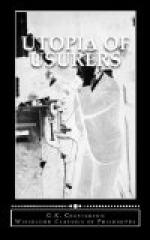Now this is a perfectly plain piece of brute logic. We need not go into the other delicious things in the article, as when it says that “in old times Parliament had to be protected against Royal invasion by the man in the street.” Parliament has to be protected now against the man in the street. Parliament is simply the most detested and the most detestable of all our national institutions: all that is evident enough. What is interesting is the blank and staring fallacy of the attempted reply.
When the Journalist Is Ruined
A long while ago, before all the Liberals died, a Liberal introduced a Bill to prevent Parliament being merely packed with the slaves of financial interests. For that purpose he established the excellent democratic principle that the private citizen, as such, might protest against public corruption. He was called the Common Informer. I believe the miserable party papers are really reduced to playing on the degradation of the two words in modern language. Now the word “comnon” in “Common Informer” means exactly what it means in “common sense” or “Book of Common Prayer,” or (above all) in “House of Commons.” It does not mean anything low or vulgar; any more than they do. The only difference is that the House of Commons really is low and vulgar; and the Common Informer isn’t. It is just the same with the word “Informer.” It does not mean spy or sneak. It means one who gives information. It means what “journalist” ought to mean. The only difference is that the Common Informer may be paid if he tells the truth. The common journalist will be ruined if he does.
Now the quite plain point before the party journalist is this: If he really means that a corrupt bargain between a Government and a contractor ought to be judged by public opinion, he must (nowadays) mean Parliament; that is, the caucus that controls Parliament. And he must decide between one of two views. Either he means that there can be no such thing as a corrupt Government. Or he means that it is one of the characteristic qualities of a corrupt Government to denounce its own corruption. I laugh; and I leave him his choice.




